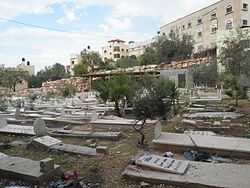Azzun
| Azzun | |
|---|---|
| Other transcription(s) | |
| • Arabic | عزّون |
| • Also spelled | 'Azzoun (official) Azon (unofficial) |

Azzun
|
|
 Map of path of the separation barrier around the Qalqilya and Hableh-Ras Atiya enclaves and the proposed path around Azzun |
|
| Location of Azzun within the Palestinian territories | |
| Coordinates: 32°10′35″N 35°03′34″E / 32.17639°N 35.05944°ECoordinates: 32°10′35″N 35°03′34″E / 32.17639°N 35.05944°E | |
| Palestine grid | 155/175 |
| Governorate | Qalqilya |
| Government | |
| • Type | Municipality |
| • Head of Municipality | Ahmed Abdullah Umran Shanarah |
| Area | |
| • Jurisdiction | 9,130 dunams (9.1 km2 or 3.5 sq mi) |
| Population (2006) | |
| • Jurisdiction | 8,300 |
| Name meaning | Azzun, personal name |
Azzun (also spelled Azzoun) (عزّون, from the root word عز ′izz which means honor or esteem) is a Palestinian town in Qalqilya Governorate in the northern West Bank, located 9 kilometers east of Qalqilya and 24 kilometers south of Tulkarm. According to the Palestinian Central Bureau of Statistics census, Azzun, together with the adjacent villages of Islah and Izbat al-Tabib, had a population of over 8,900 in 2007. The vast majority of the inhabitants are Muslim, with a very small Christian minority.
Just north of the village six -seven dry stone towers were examined in 1873. The best-preserved had six courses standing, and part of the roof. The locals stated that they were ancient vineyard towers.
Azzun was a site of battle - part of Napoleon Bonaparte's campaign in Ottoman Syria. An Arab poet, Ibrahim Touqan was quoted as saying, "by means of Azzun, how soaked [in] the blood [of] Franks [in the] mother valley."
When the French army marched into Palestine under the command of Napoleon in February 1799, it faced powerful and unexpected resistance from the inhabitants of Jabal Nablus under the command of their local leaders. They attacked the French army while it was marching towards Acre, especially near the valley of Azzun, taking part in the battle of Tal-Tabur. The participation of the inhabitants and local leaders of Nablus in the struggle against Napoleon reflects a territorial sense in resistance to a foreign army. Ihsan al-Nimr wrote in this regard that “the truth is that [Bonaparte’s] morale was weakened around Jabal Nablus, in the valley of Azzun, Qaqun, and al-Marj … he headed for Acre with disappointment and without determination” (al-Nimr 1961, p. 223-224). They fought for their homeland and interests. Sheikh Yussuf Jarrar wrote a poem asking the inhabitants, especially the prominent families of Jabal Nablus, to march towards Acre in order to fight the French. (Al-Nimr 1961, p. 210-211). In Doumani’s words, the poet exposes “the cohesiveness of this reign’s social formation and the shared sense of identity among its inhabitants versus the factionalism of multiple territorially based centers of power … The most striking aspect of this poem is what it does not say. Not once in its twenty-one verses does it mention Ottoman rule, much less the need to protect the empire or the glory and honor of serving the sultan”Pierre Jacotin called the village Hazoun on his map in 1799 from the same campaign.
...
Wikipedia

